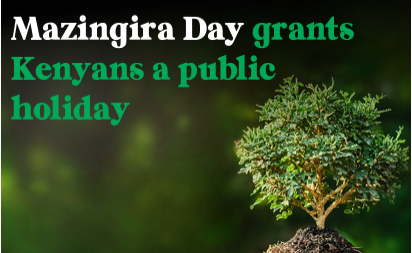Kenyans are today marking Mazingira Day, a public holiday celebrated every October 10. The day, which has undergone several transformations over the years, is now dedicated to promoting environmental protection and conservation across the country.
Originally known as Moi Day, the holiday was established to honor former President Daniel arap Moi. However, the 2010 Constitution excluded Moi Day from the list of national holidays. In 2017, the High Court ruled that its removal was unconstitutional, reinstating it as a public holiday.
In December 2019, the Cabinet approved a proposal to rename Moi Day to Huduma Day, shifting the focus to community service and national unity. A year later, in 2020, then Interior Cabinet Secretary Fred Matiang’i gazetted it as Utamaduni Day, highlighting Kenya’s cultural diversity and heritage.
The latest transformation came in April 2024, when President William Ruto assented to the Statute Law (Miscellaneous Amendments) Bill, which officially replaced Utamaduni Day with Mazingira Day under the Public Holidays Act (Cap. 110).
A brief accompanying the amendment explained that the change aims to complement government efforts in environmental conservation. “This seeks to encourage all Kenyans to participate in environmental protection activities, including tree planting,” it read.
Mazingira Day supports the government’s ambitious plan to plant 15 billion trees by 2032 as part of its strategy to combat climate change and restore Kenya’s forest cover.
Across the country, Kenyans are expected to engage in tree planting, cleanup drives, and awareness campaigns, underscoring the message that caring for nature is a shared national duty.
Mazingira Day now stands not only as a day of rest but also as a symbol of Kenya’s renewed commitment to environmental stewardship, ensuring a greener and more sustainable future for generations to come.

